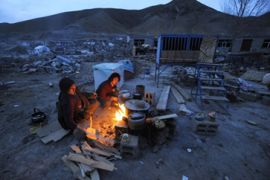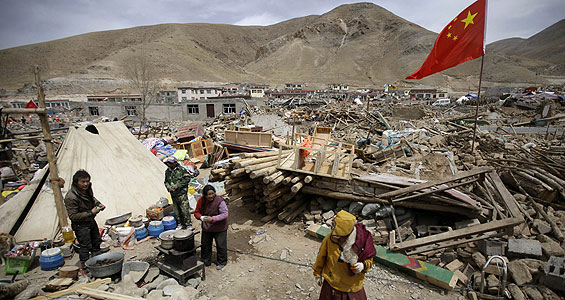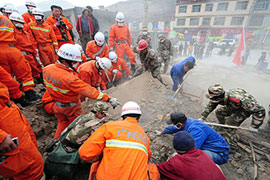Cold grips China quake survivors
Thousands go hungry in freezing temperatures, waiting for emergency help.

 |
| Many survivors were left to fend for themselves as they waited for emergency aid [Reuters] |
Thousands of survivors in quake-hit Qinghai province in western China continue to wait for emergency aid, after spending a second night without shelter in freezing temperatures.
As the death toll reached 1,144, rescue teams rushed to reach those believed to still be trapped in rubble and collapsed buildings in the sparsely populated remote mountainous region.
Keep reading
list of 4 itemsTurtles swimming to extinction in Malaysia as male hatchlings feel heat
Could shipping containers be the answer to Ghana’s housing crisis?
Thousands protest against over-tourism in Spain’s Canary Islands
Relief aid convoys headed towards the hard-hit town of Jiegu, not far from the quake’s epicentre, on Friday, as rescuers reportedly kept finding survivors who had been trapped for over three days.
Excavators and other heavy equipment were among the machinery trickling into town. But they remained unequal to the scale of the destruction in Jiegu and locals continued to pick frantically through collapsed buildings.
Urgent need
The limited transportation ability of the single main road from the provincial capital and a small, congested airport were slowing the delivery of aid, as officials said tents, food, clothing and quilts were urgently needed.
“I have lost everything,” a distraught ethnic Tibetan woman, who gave her name as Sonaman, told the AFP news agency.
Wandering the streets with her four-year-old nephew tucked under her coat, Sonaman, 52, said through tears that her mother, father, and sister had died.
|
Qinghai province is also home to many monasteries, which were hit hard in the quake |
“My house has been destroyed. It’s been flattened. My family lost 10 people. We have nothing. We have nothing to eat.”
The strongest of the quakes in the mountainous area about 4,000 metres above sea level registered a magnitude of 6.9 by the US Geological Survey and 7.1 by China’s earthquake administration.
The ministry of civil affairs said 15,000 houses had collapsed and 100,000 people needed to be relocated after the quake, which also toppled Buddhist temples, cracked a dam and triggered landslides, further hampering rescue efforts.
With more than 400 people still missing, officials said the death toll is likely to increase.
The official Xinhua News Agency said almost 11,500 people were also injured.
More than 1,100 survivors in a serious condition are being transferred to hospitals in bigger cities.
Real challenge
Al Jazeera’s Melissa Chan, reporting from Yushu town, said rescue workers going through the rubble were saying that they can hear signs of life from people still trapped underneath.
“One of the challenges is going to be how to get to the trapped survivors because it is quite dangerous for the rescue workers themselves as they think there might be signs of life in [the] piles of rubble,” said our correspondent.
| From our correspondent |
“This is going to be the challenge in the coming days for rescue workers as they fan out across the region looking for life in different pockets of area.”
Rescuers and survivors also had to contend with hundreds of aftershocks since the initial quake, including one with a 4.5 magnitude late on Thursday.
Thousands of rescuers in the region also had to cope with a lack of oxygen in the thin atmosphere.
Reports said Jiegu’s altitude of around 3,600 metres could cause problems for injured victims.
Miao Chonggang, the deputy director for emergency response under the China Earthquake Administration, said in Beijing that even the sniffer dogs were affected by altitude sickness.
National broadcaster CCTV said a steady stream of rescuers were arriving in Yushu county, the quake’s epicentre, to join a third day of search efforts on Friday.
Their equipment includes high-tech gear to help detect signs of life. Small cameras and microphones attached to poles that can be snaked into crevices were being used as well as motion and heat detectors.
All-out efforts
Zou Ming, the disaster relief director with the ministry of civil affairs, said in Beijing that more than 10,000 soldiers, police, firefighters and medical workers were already in Yushu by Thursday.
Wen Jiabao, the Chinese premier, called for all-out efforts to find survivors after touring Yushu on Thursday.
 |
| Some 10,000 rescuers are racing against time to reach trapped victims [AFP] |
“We will make all-out efforts to build a new Yushu,” Wen told victims, according to official Xinhua news agency.
Wen postponed a trip to Southeast Asia, while Hu Jintao, the Chinese president, cut short a Latin American tour to deal with the disaster.
A larger focus in the destruction was collapsed schools, an eerie echo of the massive Sichuan quake in 2008, in which thousands of students died when their poorly built schools collapsed.
Xinhua quoted a local education official as saying 66 children and 10 teachers had died, mostly in three schools.
Rescue crews focused on recovering children buried underneath the rubble at the Yushu No 3 Primary School, Xu Lai, a spokesman for the Qinghai-based educational NGO Gesanghua, said.
“Most of the collapsed buildings were the first and third grade classrooms because they were fragile structures made from mud rather than brick and cement.”